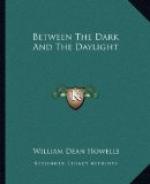The stranger paused again, and Wanhope said: “Those swift transitions of mood are very interesting. Of course they occur in that remote region of the mind where all incidents and sensations are of one quality, and things of the most opposite character unite in a common origin. No one that I remember has attempted to trace such effects to their causes, and then back again from their causes, which would be much more important.”
“Yes, I dare say,” Minver put in. “But if they all amount to the same thing in the end, what difference would it make?”
“It would perhaps establish the identity of good and evil,” Wanhope suggested.
“Oh, the sinners are convinced of that already,” Minver said, while Rulledge glanced quickly from one to the other.
The stranger looked rather dazed, and Rulledge said: “Well, I don’t suppose that was the conclusion of the whole matter?”
“Oh no,” the stranger answered, “that was only the beginning of the conclusion. I didn’t go to sleep at once, though I felt so much at peace. In fact, Melford beat me, and I could hear him far in advance, steaming and whistling away, in a style that I recalled as characteristic, over a space of intervening years that I hadn’t definitely summed up yet. It made me think of a night near Narragansett Bay, where two friends of mine and I had had a mighty good dinner at a sort of wild club-house, and had hurried into our bunks, each one so as to get the start of the others, for the fellows that were left behind knew they had no chance of sleep after the first began to get in his work. I laughed, and I suppose I must have gone to sleep almost simultaneously, for I don’t recollect anything afterwards till I was wakened by a kind of muffled bellow, that I remembered only too well. It was the unfailing sign of Melford’s nightmare.




